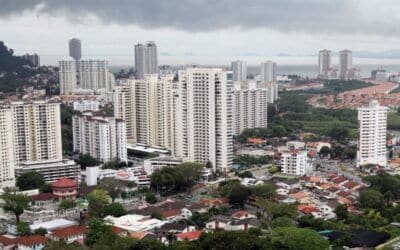Last updated September 25th, 2023.
For the last few decades, Asia has experienced one of the most powerful economic booms in history.
Property prices, and as a result the prominence of real estate agents, have grown in alongside the region’s investment prospects as a whole.
Yet a major mistake that foreign property investors make is transposing their own world onto a market that operates very differently.
Buying property in Asia through a realtor is generally a solid idea for investors who want the benefits of emerging economies.
Still, you should know how to invest here correctly – and where to find the best real estate agents in any given country – to have the greatest chance of success.
Learning how realtors operate in Asia is key to that success. The exact details of how realtors function will, of course, vary based on which territory you’re in.
A few things are true about realtors in Asia regardless of the specific country we’re talking about though.
For starters, the role real estate agents play and their dynamics are very different compared to their function in western markets.
A general rule of thumb is, the less developed a region is, the more important personal contacts are, and the more “hands-on” you’ll have to be to find good deals.
To be able to work properly in foreign markets, we must first understand why they’re structured the way they are.
In this article, we’ll explain how real estate agents work in Asia… and how you can profit the most from each country’s system.

In emerging Asia, sellers frequently decide not to use a realtor. They’ll instead merely place a “for sale” sign outside their plot of land, apartment, or house for sale. Word of mouth is also important.
Realtors in Asia: East vs. West
Since before the US became a country, it attracted colonists with the promise of land ownership. Every person was promised a share of the expanding New World.
Over time, as it became a nation in its own right and gained global influence, this idea of a property-owning democracy began to take hold in the Western World.
As such, every region marginally affiliated with US interests began to take notes from its real estate philosophy.
Fast forward a couple of centuries and you have a streamlined international market where you can shop online, talk to real estate agents, and navigate the system to quickly find the right property for you.
Asia didn’t have the same influence in contrast. Until recently, it was still common for generations of families to live on the same plot of land or in the same house.
Even nowadays, changing ownership of homes is normally a once-in a lifetime situation in many countries across Asia.
And because many property markets in developing Asia aren’t quite up to international standards, sales are perhaps done far more informally than one would like.
In several frontier markets, the locals don’t use agents at all. They’ll instead market their properties based on word-of-mouth. Or simply hang a “for sale” sign outside their home’s window.
If you want to make good deals in places like these, you will have to be a bit more creative than you might expect.
For example, in his first few Cambodian real estate deals, our founder, Reid, learned the words “for sale” in Khmer and rode on a motorcycle looking for those signs around town.
Then, he took down the phone numbers on the “for sale” signs and hired a local to call and make appointments to see the properties.
It was all a bit experimental and adventurous. But maybe a bit too much for a typical real estate investor.
As such, and while Asian cultures often haven’t quite embraced property agents, they certainly do exist here. Realtors in emerging markets usually cater to the expat community though.
In developing nations like Vietnam and Myanmar, realtors are mostly a service aimed toward making the lives of foreigners lives easier and targeting their deeper pockets.
Therefore, don’t expect to easily find a great deal or see the entire market through realtors in every country.

Condo advertisements try to be alluring. They aren’t a yield-optimized investment though. Of course, the whole point of a condo developer is to profit from the difference between the construction cost and sales price.
How Real Estate Agents in Asia Work
The quickest way to lose money abroad is to be stubborn and try to do things “your” way. You must adapt to the on-the-ground realities of the situation, rather than your own wishes.
For the most part, you won’t find any concept of “buyer agents” or “seller agents” in Asia. Realtors merely list properties for sale, and generally do not act specifically as a buyer representative.
Their fees can also fluctuate widely, depending on where you’re buying property. Commission rates for realtors vary between 1% and 5%, depending on other factors. Practically everywhere in Asia, the seller is supposed to pay agency fees.
Realtor fees are lower in places with a high average price per square meter like Hong Kong and Singapore.
For expensive properties in the multimillion-dollar range, commissions may be as low as 0.5%.
Whether they’re worth their commission remains up for debate. Overall, don’t expect all realtors in emerging or frontier markets to meet the standards of those in a developed economy.
The most common issues you might find, even sometimes among the top realtors in any given country are:
- The paperwork, including the rental contract or property transfer documentation, wasn’t written by a lawyer and isn’t legally binding. So, you might land yourself in a prolonged legal dispute, or have to absorb the loss.
- Rather than being impartial agents, realtors could have bias and negotiate in favor of one party. This is even true regarding several of the best real estate agents in Asia.
- You’re only exposed to a fraction of the available options on the market, given the opaque nature of the real estate sector and frequency of “word-of-mouth” deals.
- In countries without a both a buyer’s agent and seller’s agent, it’s oftentimes only the seller who truly has a representative acting in their interests.
Local Property Knowledge Is Paramount
A difficult-to-accept fact when investing abroad is that you are an outsider. Likely no amount of living there and learning the language or culture will ever give you the social nuance necessary to navigate the local scene better than a native.
The easy way is to simply visit property agents who cater to expats. Be warned though, they might charge a hefty fee for their services… even if it’s not explicitly advertised or charged to you.
In some countries, you’ll automatically lose bargaining power and choice when using a realtor. Emerging and frontier markets don’t exactly have a multiple listing service (MLS), and as a result, realtors only show the properties which are already listed through them by sellers.
Nobody has access to a central database of listed properties. And real estate agents rarely search around town, finding houses and apartments for sale by themselves. Sellers must contact them first.
As a buyer, the result is that you’re probably looking at small sample size of the overall market if you’re only using a single realtor. Especially in countries like Thailand, Cambodia, and Vietnam.
Furthermore, even in cases where sellers are supposed to pay the finder’s fee in practice, this cost is often passed onto the buyer instead.
In many cases, if you contact a seller directly, they’ll negotiate a cheaper cost by not using an agent. Other times, a realtor will act as an “undercover negotiator” on behalf of the seller, splitting fees in exchange for convincing the buyer to pay a higher price.
Wherever there is money to be made, there will be people of ill repute wishing to make a quick buck.
It’s also a huge advantage for these disreputable people if their potential victims can’t be warned by others of their infamy. As such, foreigners without language skills are an ideal target.
Don’t get us wrong here: not every real estate agent in emerging Asia does business like this. Nonetheless, enough of them exist that you should keep your guard up and work with a reputable company.
If you’re dependent on third parties to help you find good deals though, it’s best to align their interests with yours. As such, we suggest you go down the route we usually do, where we enlist locals to translate and contact sellers directly.
Another tactic that we’ve seen work quite well is to go to a top law firm in the country, hire the chief lawyer for some legal procedure, and perhaps even overpay for the services rendered. Then, you befriend them.
In this way, you enlist a helpful and well-connected lawyer, obtain access to important people (along with their business opportunities), and you won’t fall for the same traps that other foreigners fall into.
Regardless of how ultimately decide on proceeding, the key takeaway is that you shouldn’t enter an unfamiliar market without preparation and local partners.
Sometimes it might be necessary to have a local partner or realtor in Asia. Many countries have restrictions on foreigners owning property on their own.
Overall, real estate do indeed provide a valuable service and offer convenience – especially if you’re a foreign buyer in an unfamiliar land.
Just remember: yield-optimized investments may require effort and creativity on your part. The best deals are often quickly snatched up when listed by a realtor, or in any public space for that matter.
Skip the Next Western Recession
Learn the best places to invest - and where to avoid - by downloading our free Investment Cheat Sheet.







